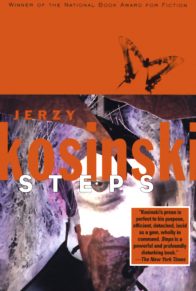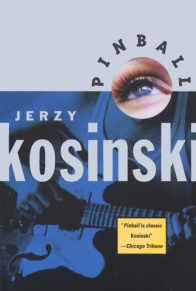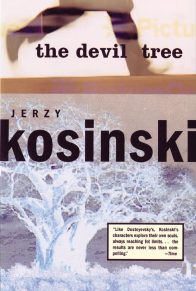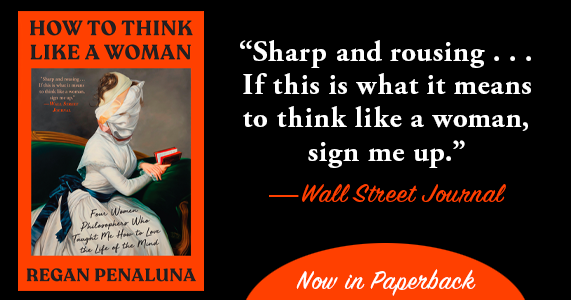In the meantime, the boy’s foster mother died within two months of his arrival, and the child was left alone to wander from one village to another, sometimes sheltered and sometimes chased away.
The villages in which he was to spend the next four years differed ethnically from the region of his birth. The local peasants, isolated and inbred, were fair-skinned with blond hair and blue or gray eyes. The boy was olive-skinned, dark-haired, and black-eyed. He spoke a language of the educated class, a language barely intelligible to the peasants of the east.
He was considered a Gypsy or Jewish stray, and harboring Gypsies or Jews, whose place was in ghettos and extermination camps, exposed individuals and communities to the harshest penalties at the hands of the Germans.
The villages in that region had been neglected for centuries. Inaccessible and distant from any urban centers, they were in the most backward parts of Eastern Europe. There were no schools or hospitals, few paved roads or bridges, no electricity. People lived in small settlements in the manner of their great-grandfathers. Villagers feuded over rights to rivers, woods, and lakes. The only law was the traditional right of the stronger and wealthier over the weaker and poorer. Divided between the Roman Catholic and the Orthodox faiths, the people were united only by their extreme superstition and the innumerable diseases plaguing men and animals alike.
They were ignorant and brutal, though not by choice. The soil was poor and the climate severe. The rivers, largely emptied of fish, frequently flooded the pastures and fields, turning them into swamps. Vast marshlands and bogs cut into the region, while dense forests traditionally sheltered bands of rebels and outlaws.
The occupation of that part of the country by the Germans only deepened its misery and backwardness. The peasants had to deliver a large part of their meager crops to the regular troops on the one hand, and to the partisans on the other. Refusal to do so could mean punitive raids on the villages, leaving them in smoldering ruins.
I lived in Marta’s hut, expecting my parents to come for me any day, any hour. Crying did not help, and Marta paid no attention to my sniveling.
She was old and always bent over, as though she wanted to break herself in half but could not. Her long hair, never combed, had knotted itself into innumerable thick braids impossible to unravel. These she called elflocks. Evil forces nested in the elflocks, twisting them and slowly inducing senility.
She hobbled around, leaning on a gnarled stick, muttering to herself in a language I could not quite understand. Her small withered face was covered with a net of wrinkles, and her skin was reddish brown like that of an overbaked apple. Her withered body constantly trembled as though shaken by some inner wind, and the fingers of her bony hands with joints twisted by disease never stopped quivering as her head on its long scraggy neck nodded in every direction.
Her sight was poor. She peered at the light through tiny slits embedded under thick eyebrows. Her lids were like furrows in deeply plowed soil. Tears were always spilling from the corners of her eyes, coursing down her face in well-worn channels to join glutinous threads hanging from her nose and the bubbly saliva dripping from her lips. She looked like an old green-gray puffball, rotten through and waiting for a last gust of wind to blow out the black dry dust from inside.
At first I was afraid of her and closed my eyes whenever she approached me. All I could sense then was the foul smell of her body. She always slept in her clothes. They were, according to her, the best defense against the danger of the numerous diseases which fresh air might waft into the room.
To insure health, she claimed, a person should wash no more than twice a year, at Christmas and Easter, and even then very lightly and without undressing. She used hot water only to relieve her countless corns, bunions, and the ingrown toenails on her gnarled feet. That is why she soaked them once or twice a week.
Often she stroked my hair with her old, trembling hands that were so like garden rakes. She encouraged me to play in the yard and make friends with the household animals.
Eventually I realized that they were less dangerous than they appeared. I remembered the stories about them which my nurse used to read to me from a picture book. These animals had their own life, their loves and disagreements, and they held discussions in a language of their own.
The hens crowded the chicken house, jostling one another to reach the grain I threw to them. Some strolled in pairs, others pecked weaker ones and took solitary baths in puddles after the rain or foppishly ruffled their feathers over their eggs and quickly fell asleep.
Strange things happened in the farmyard. Yellow and black chicks hatched out of the eggs, resembling little live eggs on spindly legs. Once a lonely pigeon joined the flock. He was clearly unwelcome. When he made a landing in a flurry of wings and dust amidst the chickens, they scurried away, frightened. When he began to court them, cooing gutturally as he approached them with a mincing step, they stood aloof and looked at him with disdain. They invariably ran away clucking as soon as he drew closer.
One day, when the pigeon was trying as usual to consort with the hens and chicks, a small black shape broke away from the clouds. The hens ran screaming toward the barn and the chicken coop. The black ball fell like a stone on the flock. Only the pigeon had no place to hide. Before he even had time to spread his wings, a powerful bird with a sharp hooked beak pinned him to the ground and struck at him. The pigeon’s feathers were speckled with blood. Marta came running out of the hut, brandishing a stick, but the hawk flew off smoothly, carrying in its beak the limp body of the pigeon.
Marta kept a snake in a special small rock garden, carefully fenced in. The snake slithered among the leaves sinuously, waving its forked tongue like a banner at a military review. It seemed quite indifferent to the world; I never knew if it noticed me.
On one occasion the snake hid itself deep under the moss in its private quarters, staying there for a very long time without food or water, participating in strange mysteries about which even Marta preferred to say nothing. When it finally emerged, its head glistened like an oiled plum. An incredible performance followed. The snake sank into immobility with only very slow shivers running along its coiled body. Then calmly it crawled out of its skin, looking suddenly thinner and younger. It did not wave its tongue any more but seemed to wait for its new skin to harden. The old, semitranslucent skin had been completely discarded and was marched upon by disrespectful flies. Marta lifted the skin with reverence and hid it in a secret place. A skin like this had valuable remedial properties, but she said I was too young to understand their nature.
Marta and I had watched this transformation with amazement. She told me that the human soul discards the body in a similar manner and then flies up to God’s feet. After its long journey God picks it up in His warm hands, revives it with His breath, and then either turns it into a heavenly angel or casts it down into hell for eternal torture by fire.
A small red squirrel often visited the hut. After a meal it would dance a jig in the yard, beating its tail, uttering tiny squeaks, rolling, jumping, and terrorizing the chickens and pigeons.
The squirrel visited me daily, sitting on my shoulder, kissing my ears, neck, and cheeks, teasing my hair with its light touch. After playing it would vanish, returning to the wood across the field.
One day I heard voices and ran to the nearby rise. Hiding in the bushes, I was horrified to see some village boys chasing my squirrel through the field. Running frantically, it tried to reach the safety of the forest. The boys threw rocks in front of it to cut it off. The tiny creature weakened, its leaps shortened and slowed. The boys finally caught it, but it bravely continued to struggle and to bite. Then the boys, bending over the animal, poured some liquid from a can on it. Feeling that something horrible was about to be done, I tried desperately to think of some way to save my little friend. But it was too late.
One of the boys took a piece of smoldering wood out of the can slung over his shoulder and touched the animal with it. Then he threw the squirrel to the ground where it immediately burst into flames. With a squeal that stopped my breath it leapt up as if to escape from the fire. The flames covered it; only the bushy tail still wagged for a second. The small smoking body rolled on the ground and was soon still. The boys looked on, laughing and prodding it with a stick.
With my friend dead I no longer had anyone to wait for in the morning. I told Marta what had happened, but she did not seem to understand. She muttered something to herself, prayed, and cast her secret enchantment over the household to ward off death, which, she maintained, was lurking close by and trying to enter.
Marta became sick. She complained about a sharp pain under the ribs, where the heart flutters caged forever. She told me that either God or the Devil had sent a disease there to destroy yet another being and thus put an end to her sojourn on earth. I could not understand why Marta did not discard her skin like the snake and start life all over again.
When I suggested this to her she grew angry and cursed me for being a blasphemous Gypsy bastard, kin to the Devil. She said that disease enters a person when he least expects it. It might be sitting behind you in a cart, jump on your shoulders as you bend down to pick berries in the woods, or crawl out of the water as you cross the river in a boat. Disease sneaks into the body invisibly, cunningly, through the air, water, or by contact with an animal or another person, or even–and here she gave me a wary look–from a pair of black eyes set close to a hawk nose. Such eyes, known as Gypsy or witches’ eyes, could bring crippling illness, plague, or death. That is why she forbade me to look directly into her eyes or even those of the household animals. She ordered me to spit quickly three times and cross myself if I ever accidentally looked into an animal’s eyes or her own.
She often became enraged when the dough she kneaded for bread turned sour. She blamed me for casting a spell and told me I would get no bread for two days as punishment. Trying to please Marta and not to look into her eyes, I walked about the hut with my eyes closed, stumbling over furniture, overturning buckets, and trampling flower beds outside, knocking against everything like a moth blinded by sudden brightness. In the meantime Marta collected some goose down, and scattered it over burning coals. She blew the resulting smoke all over the room to the accompaniment of incantations designed to exorcise the evil spell.
She would announce, finally, that the spell was lifted. And she was right, for the next baking always produced good bread.
Marta did not succumb to her sickness and pain. She waged a constant, wily battle against them. When her pains started bothering her, she would take a chunk of raw meat, chop it up finely, and place it in an earthenware jar. Then she would pour water over it that was drawn from a well just before sunrise. The jar was then buried deep in a corner of the hut. This would bring her relief from the aches for a few days, she said, until the meat decomposed. But later, when the pains returned, she went through the whole painstaking procedure once again.
Marta never drank any fluids in my presence, and she never smiled. She believed that if she did so, it could give me a chance to count her teeth, and that each tooth so counted would subtract one year from her life. It is true that she did not have many teeth. But I realized that at her age every year was very precious.
I tried to drink and eat without showing my teeth, and I practiced looking at my own reflection in the blue-black mirror of the well, smiling at myself with unopened mouth.
I was never allowed to pick up any of her lost hairs from the floor. It was well known that even a single lost hair, if spied by an evil eye, could be the cause of serious throat trouble.
In the evenings Marta sat by the stove, nodding and mumbling prayers. I sat nearby thinking of my parents. I recalled my toys, which now probably belonged to other children. My big teddy bear with glass eyes, the airplane with the turning propellers and its passengers whose faces were visible through the windows, the small easy-moving tank, and the fire engine with its extending ladder.
Suddenly Marta’s hut would become warmer as the pictures grew sharper, more real. I could see my mother sitting at the piano. I heard the words of her songs. I recalled my fear before an appendix operation when I was only four years old, the glossy hospital floors, the gas mask the doctors placed on my face which prevented me from even counting to ten.
But this past of mine was rapidly turning into an illusion like one of my old nanny’s incredible fables. I wondered whether my parents would ever find me again. Did they know that they should never drink or smile in the presence of evil-eyed people who might count their teeth? I would remember my father’s broad, relaxed smile and begin to worry; he showed so many teeth that if an evil eye were to count them, he would most certainly die very soon.
One morning when I awoke the hut was cold. The fire in the stove was out and Marta was still sitting in the middle of the room, her many skirts tucked up and her bare feet resting in a bucket full of water.
I tried to speak to her, but she did not answer. I tickled her cold, stiff hand, but the knobby fingers did not move. The hand hung down from the arm of the chair like wet linen from a clothesline on a still day. When I lifted her head, her watery eyes seemed to be staring up at me. I had seen such eyes only once before, when the stream threw up the bodies of dead fish.
Marta, I concluded, was waiting for a change of skin and, like the snake, she could not be disturbed at such a time. Though uncertain what to do, I tried to be patient.
It was late fall. The wind was cracking the brittle twigs. It tore off the last of the wrinkled leaves, tossing them into the sky. Hens perched owlishly on their roosts, sleepy and depressed, opening with distaste one eye at a time. It was cold, and I did not know how to kindle a fire. All my efforts to talk to Marta failed to elicit any response. She sat there motionless, staring fixedly at something I could not see.
I went back to sleep, having nothing else to do, confident that when I woke up Marta would be scurrying around the kitchen humming her mournful psalms. But when I awoke in the evening she was still soaking her feet. I was hungry and frightened of the darkness.
I decided to light the oil lamp. I began to search for the matches Marta kept safely hidden. I carefully took the lamp off the shelf, but it slipped in my hand and spilled some kerosene on the floor.
The matches refused to light. When one finally flared up, it broke off and fell on the floor into the pool of kerosene. At first the flame timidly stopped there, casting off a puff of blue smoke. Then it boldly leapt into the middle of the room.
It was no longer dark, and I could plainly see Marta. She did not appear to notice what was happening. She did not seem to mind the flame, which had by then moved to the wall and up the legs of her wicker chair.
It was not cold any more. The flame was now close to the bucket in which Marta was soaking her feet. She must have felt the heat, but she did not move. I admired her endurance. After having sat there all night and all day, she still did not stir.
It became very hot in the room. Flames climbed up the walls like clinging vines. They flapped and crackled like dried pods underfoot, especially by the window where a meager draft managed to penetrate. I stood by the door, ready to run, still waiting for Marta to move. But she sat stiffly, as though unaware of anything. The flames started to lick her dangling hands as might an affectionate dog. They now left purple marks on her hands and climbed higher toward her matted hair.
The flames sparkled like a Christmas tree, and then burst into a high blaze, forming a peaked hat of fire on Marta’s head. Marta became a torch. Flames circled her tenderly from all sides, and the water in the bucket hissed when shreds of her ragged rabbit-fur jacket fell into it. I could see under the flames patches of her wrinkled, sagging skin and whitish spots on her bony arms.
I called out to her for the last time as I ran outside into the yard. The hens were cackling furiously and beating their wings in the coop adjoining the house. The usually placid cow was mooing and butting the barn door with her head. I decided not to wait for Marta’s permission, and set about freeing the hens on my own. They rushed out hysterically, and tried to take flight on desperate, beating wings. The cow succeeded in breaking down the barn door. She took up an observation point at a safe distance from the fire, pensively chewing her cud.
By now the inside of the hut was a furnace. Flames jumped through the windows and holes. The thatched roof, catching fire from below, was smoking ominously. I marveled at Marta. Was she really so indifferent to all this? Had her charms and incantations granted her immunity against a fire that turned everything else about her into ashes?
She still had not come out. The heat was becoming unbearable. I had to move to the far end of the yard. The chicken coops and the barn were now on fire. A number of rats, frightened by the heat, scurried wildly across the yard. The yellow eyes of a cat, reflecting the flames, gazed from the dark edges of the field.
Marta failed to appear, though I was still convinced that she could emerge unscathed. But when one of the walls collapsed, engulfing the charred interior of the hut, I began to doubt that I would ever see her again.
In the clouds of smoke rising to the sky I thought I detected a strange oblong shape. What was it? Could it be Marta’s soul making its escape to the heavens? Or was it Marta herself, revived by the fire, relieved of her old crusty skin, leaving this earth on a fiery broomstick like the witch in the story my mother told me?
Still staring into the spectacle of sparks and flame, I was jolted out of my reverie by the sound of men’s voices and barking dogs. The farmers were coming. Marta always warned me about the village people. She said if they ever caught me alone they would drown me like a mangy kitten or kill me with an ax.
I started running as soon as the first human figures appeared within the circle of light. They did not see me. I ran madly, hitting unseen tree stumps and thorny bushes. I finally fell into a ravine. I heard the faint voices of people and the crash of the falling walls, and then I fell asleep.
I woke up at dawn, half frozen. A shroud of mist hung between the edges of the ravine like a spider’s web. I scrambled back to the top of the hill. Wisps of smoke and an occasional flame rose over the pile of scorched wood and ashes where Marta’s hut had stood.
Everything around was silent. I believed that now I would meet my parents in the ravine. I believed that, even far away, they must know all that had happened to me. Wasn’t I their child? What were parents for if not to be with their children in times of danger?
Just in case they should be coming near, I called out to them. But no one answered.
I was weak and cold and hungry. I had no idea what to do or where to go. My parents were still not there.
I trembled and vomited. I had to find people. I had to go to the village.
I limped on my bruised feet and legs, cautiously making my way over the yellowing autumn grass toward the distant village.
Copyright ” 1965, 1976 by Jerzy N. Kosinski. Reprinted with permission from Grove Atlantic, Inc. All rights reserved.















